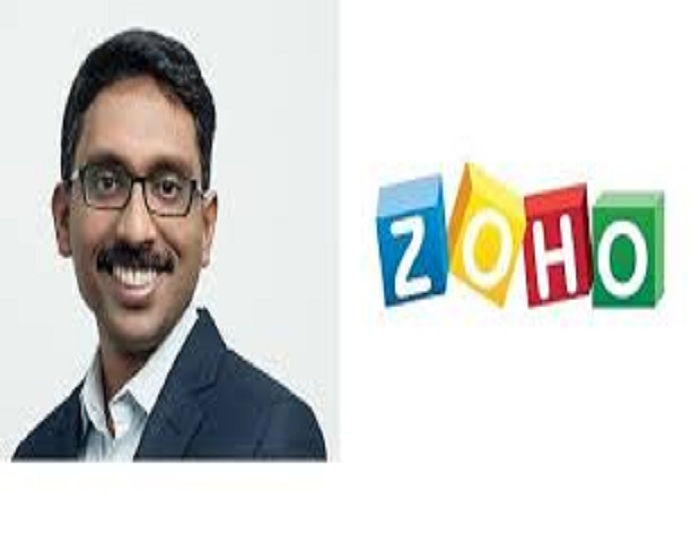General News
Zoho Desk Achieves 45% CAGR over 5 years, As it Introduces Blended Conversations to Deliver Exceptional Support

Zoho Corporation, a leading global technology company, today launched new tools for Zoho Desk, the anchor application in the company’s customer service platform, to help customer service teams evolve with the changing needs of customers and meet heightened business expectations.

Zoho Desk, which has achieved 45% year-over-year revenue growth for the past five years in Nigeria and globally, now serves more than 100K businesses around the world.The platform has also witnessed a phenomenal adoption across the MEA region, achieving 580% CAGR over the past five years.
New capabilities in Zoho Desk include Blended Conversations—a seamless combination of human-driven and bot-powered conversational service experiences—as well as several refinements to the user interface to make it simpler, faster, and more accessible to users with a wide spectrum of different needs.
These additions enable customer service agents to improve engagement and deliver higher-value customer experiences (CX).
“During these challenging economic times, the best companies are doubling down on customer retention while simultaneously trying to do more with less,” said Hyther Nizam, President MEA, Zoho Corp.
“Great service experiences address this by forming the bedrock of sustainability through economic downturns. Blended Conversations in Zoho Desk addresses exactly this outcome by cleverly combining human and bot agents while also reducing friction, frustration, and costs-to-serve.”
To help small and micro businesses transform their customer service operations by empowering them with an easy, and value-rich helpdesk solution at an affordable price point, Zoho Desk has launched an Express Edition.
Blended Conversations for Zoho Desk allows customer service agents to deliver the best experience in the moment by delegating the majority of manual and transactional tasks to bots, while remaining in control of the overall service experience. With fast and easy deployment that does not require external help, Zoho Desk allows brands to scale their conversational service experiences through higher agent productivity without compromising on the quality of CX.
This experience is a culmination of Zoho’s Instant Messaging (IM) Framework and Guided Conversations, a low-code builder for self-service experiences. The IM Framework allows organizations to integrate any messaging service they use with Zoho Desk, and comes pre-integrated with services like WhatsApp, Telegram, Line, WeChat, Messenger, and Instagram. Guided Conversations for Zoho Desk allows business users to build powerful self-service flows that are useful throughout the customer journey, and help customers quickly and securely manage their relationship with the organization. It offers service teams tighter collaboration and integration with other Zoho marketing apps at no extra cost, including Zoho’s CX Platform and Zoho CRM Plus, for example.
Zoho also announced a technological overhaul of the user interface to include options to support: cognitive and dyslexia challenges; visual impairments including astigmatism; animation reduction for those with seizure disorders; customization capabilities for colour-blindness. This is the company’s biggest step towards improving digital accessibility to date.
Zoho continues to build a system of experiences that focuses on every aspect of the customer journey, giving every stakeholder greater ability to add value to CX, from planning and creating diverse customer experiences to delivering and evolving them for the future. Zoho’s CX offerings help organisations of all sizes enable employee productivity, improve stakeholder collaboration, and increase customer success. Specifically, Zoho Desk’s integrated omnichannel approach supports entire service teams to connect with customers and with one another. On the business side, it enables high-quality consistency and reliability. Customers, in turn, have better overall end-to-end experiences with the brand, which ultimately drives loyalty and trust.
Disclaimer: All trademarks, product names, and company names cited herein are the property of their respective owners.
Pricing
Zoho Desk starts at NGN 3600/user/month (billed annually) for the Standard Edition and goes up to NGN 10,500/user/month (billed annually) for the Enterprise Edition. A new pricing tier called the Express Edition priced at NGN 2100/user/month (billed annually) is also available, to help startups and small businesses leapfrog into a customer service platform instead of using spreadsheets and email clients to serve customers.
Zoho Privacy Pledge
Zoho respects user privacy and does not have an ad-revenue model in any part of its business, including its free products. The company owns and operates its data centers, ensuring complete oversight of customer data, privacy, and security. More than 80 million users around the world, across hundreds of thousands of companies, rely on Zoho everyday to run their businesses, including Zoho itself. For more information, please visit: https://www.zoho.com/privacy-commitment.html
General News
Kuda Unlocks Instant Online Accounts for NGOs and Religious Bodies

Kuda has updated its business banking services to allow NGOs and incorporated trustees to open and manage business accounts entirely online. The move means religious organisations, charities, and other registered organisations no longer have to navigate the long wait and paperwork traditionally associated with setting up a business account.

Nosa Oyegun,
On the Kuda Business app, organisations registered with Nigeria’s Corporate Affairs Commission (CAC) can choose the NGO option during signup, submit their CAC documents, and provide trustee details. Once verified, accounts are activated within minutes, a significant reduction from the days or weeks it can take under traditional business banking processes.
For many NGOs and religious institutions, handling donations, grants, and operational expenses has long been slowed by manual systems and branch-based requirements.
The Kuda Business update is expected to make financial management faster and more transparent, allowing organisations to focus on their mission instead of battling administrative bottlenecks.
Nigeria is home to thousands of registered NGOs and religious organisations, with Lagos State alone accounting for over 10,000 churches and mosques as of the last count in 2021. Across the country, incorporated trustees play a critical role in education, healthcare, humanitarian response and community development. Despite their scale and economic relevance, access to modern digital banking tools has remained limited for many of these institutions.
Nosa Oyegun, SVP Business Banking at Kuda, said the update is proof of Kuda’s focus on removing structural barriers that slow Nigerian organisations down. “NGOs and religious organisations are responsible for managing funds that directly impact communities, yet they are often forced to operate with outdated banking processes,” he said.
“By enabling incorporated trustees to open Kuda Business accounts entirely online quickly, we’re giving these organisations access to the same modern financial tools built by Kuda that other businesses already use, so they spend less time doing admin work.”
With Kuda Business, NGOs and religious organisations can manage incoming donations and grants, make payments, track transactions in real time, generate professional account statements for audits and reporting, and grant controlled access to trustees, treasurers and administrators, all on a single app.
Kuda designed the account signup process to meet regulatory requirements while significantly reducing manual reviews and customer support workload. Automations shorten notoriously long business signup timelines while improving information accuracy and user experience.
As reforms promoting cashless payments and digital financial services take hold in Nigeria, NGOs and religious organisations are under increasing pressure from donors, partners and regulators to operate with greater financial transparency and efficiency.
The new Kuda Business update is therefore timely, offering a dedicated digital account specifically designed for this segment, unlike many traditional banks and fintech platforms that treat incorporated trustees as special cases requiring comparatively slower manual intervention.
General News
Catholic Bishops Urge FG to Give Tax Laws Human Face

Catholic Bishops of the Ibadan Ecclesiastical Province has called on the Federal Government to implement the ongoing tax reforms with equity, openness and empathy, cautioning that policies devoid of human consideration could further compound the suffering of millions of Nigerians.

The appeal was contained in a communiqué released after the bishops’ first provincial meeting for 2026, which took place at the Jubilee Conference Centre in Ibadan, Oyo State.
The document was jointly signed by Most Rev. Gabriel Abegunrin, chairman of the Ibadan Ecclesiastical Province, and Most Rev. John Oyejola, secretary.
Recall that the tax reforms were introduced by the administration of President Bola Tinubu and assented to on June 26, 2025.
They officially came into effect on January 1, 2026, and have continued to attract diverse reactions across the country.
In the communiqué, titled “Sustaining Hope and Strengthening Our Good Efforts,” the bishops acknowledged the government’s desire to overhaul Nigeria’s tax system but expressed concern that its implementation had sparked widespread unease and debate, especially among the poor and vulnerable.
“The reforms should be anchored on fairness, transparency and accountability, urging the government to apply them with compassion.
“The bishops also advised that vulnerable citizens should be given sufficient time to adapt to the new tax regime before strict enforcement measures are introduced.”
The clerics warned that economic policies pursued without sensitivity could widen inequality and heighten social unrest, noting that taxation should not become an added burden for Nigerians already grappling with inflation, unemployment, and rising costs of living.
The bishops encouraged Nigerians to remain hopeful while backing prayers with responsible citizenship, diligence and respect for justice and the rule of law.
“As shepherds of God’s people, we urge Nigerians to reject cynicism and despair. Prayer must be accompanied by good works. This is the only country we have,” the communiqué concluded.
General News
Taraba Adopts Electronic Case Management System
Taraba State in Nigeria has developed an electronic platform for filing criminal cases in the state’s High Courts, marking the implementation of the new National Case Management System.
![]()
The launch, announced on Monday, marks a move from manual to electronic filing of criminal cases and is part of attempts to reform court processes and expand access to justice using technology.
Governor Agbu Kefas stated that the action underlines the government’s dedication to institutional strengthening, the rule of law, and effective governance.
Kefas pledged continued government support for the judiciary, noting that technology is essential for delivering swift, fair and transparent justice.
He also stated that the state would give the resources and infrastructure required to maintain the ongoing judicial reforms.
Justice Joel Agya, Chief Judge of Taraba State, stated that the e-filing facility will enable the electronic filing of originating processes and subsequent applications.
He explained that the system would enhance case tracking from filing to final determination while reducing delays caused by manual registry procedures.
Justice Agya went on to say that the platform would improve the security and accessibility of court records, as well as help judges manage dockets and time better.
He emphasised that the platform is intended to supplement rather than replace judicial decision-making, ensuring that administrative procedures do not impede the delivery of speedy justice.
The development is consistent with a broader national push to digitalise judicial processes across Nigerian courts, which has already been implemented in several regions.

 General News2 days ago
General News2 days agoCybersecurity Firm Detects a Wave of Crypto Phishing Following BlockFi Bankruptcy

 News2 days ago
News2 days agoIMF Upgrades Nigeria’s 2026 Growth Projection to 4.4%

 Telecom2 days ago
Telecom2 days agoNCC Unveils Spectrum Roadmap to Power Nigeria’s $1tr Digital Economy

 Telecom2 days ago
Telecom2 days agoNCC Gives Amazon’s Kuiper, BeetleSat Nod to Provide Satellite Broadband Services in Nigeria

 General News2 days ago
General News2 days agoFG Rejects Northern Elders’ Gold Refinery Siting Claim

 News2 days ago
News2 days agoNew Horizons Invests N50m to Empower Almajiris with Skills

 E-Financial2 days ago
E-Financial2 days agoKongaPay K-Save Users Save over N3.2Bn

 General News2 days ago
General News2 days agoUniversal Insurance to Raise N15bn to Meet Capital Rules

























